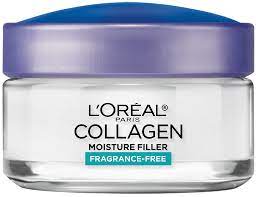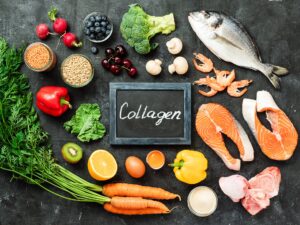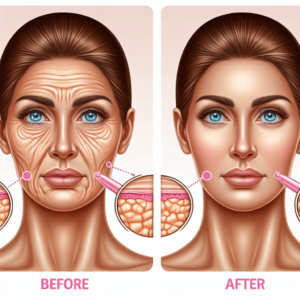
What Is Collagen? Health Benefits,
“Collagen is what keeps our skin from sagging, giving us that plump, youthful look.”
Collagen is the most abundant protein in the human body, found in the bones, muscles, skin, and tendons. Collagen makes up approximately 30% of the proteins within the body. It is the substance that holds the body together. Collagen forms a scaffold to provide strength and structure. Endogenous collagen is natural collagen, synthesized by the body.
She began spiking her morning smoothie or coffee with a scoop of ground-up cow or fish parts — aka collagen.
Within a month, her acne abated, replaced with a rosy glow. And within 3 months, she noticed a host of other unexpected changes. Her nails were thicker. Her hair stopped falling out in the shower. And she could dance without pain from her knee osteoarthritis.
“It is not a miracle pill,” she stresses, noting that she also cleaned up her diet and added a probiotic to her daily routine. “But I absolutely believe the collagen is helping.”
One 2014 study of 69 women ages 35 to 55 found that those who took 2.5 or 5 grams of collagen daily for 8 weeks showed a lot of improvement in skin elasticity, compared with those who didn’t take it.
Another found that women who took 1 gram per day of a chicken-derived collagen supplement for 12 weeks had 76% less dryness, 12% fewer visible wrinkles, better blood flow in the skin, and a 6% higher collagen content.
And a 2019 review of eight studies including 805 patients concluded that “preliminary results are promising for the short and long-term use of oral collagen supplements for wound healing and skin aging.”
Where is collagen found?

In nature, collagen is found exclusively in animals, especially in the flesh and connective tissues of mammals. Collagen is a part of the connective tissue that in the skin helps in firmness, suppleness and constant renewal of skin cells. Collagen is vital for skin elasticity.
Collagen is the main component of connective tissue, and is the most abundant protein in mammals, making up about 25% to 35% of the whole-body protein content.
Unfortunately, collagen starts to degrade with age, and your genetics can affect how fast that degradation happens. “We lose collagen year after year, and make lower quality collagen,” says Dr. Robinson
One of the more surprising benefits may be for your cardiovascular health. According to a small study on healthy adults published in the Journal of Atherosclerosis and Thrombosis in May 2017, participants who consumed a collagen tripeptide for six months had an improvement in cholesterol and arterial stiffness, suggesting that collagen may help reduce the risk of coronary artery disease
What Are the Different Types of Collagen?
According to one reference, there are 28 types of collagen. (13) Yet resources note that types 1, 2, and 3 are the most abundant collagens in the body, and these are the collagens you’ll find touted in product marketing. (2) Because the full 28 is a long list of collagen types, we’ll cover the three most prominent ones and where they’re found in the body.
Type 1 The major collagen found in the skin. Also found in tendons, bones, ligaments, teeth, and certain connective tissues (2)
Type 2 Makes up cartilage and is found in the eyes. (2)
Type 3 This type of collagen also makes up skin, as well as muscles and blood vessels. (2) This type of collagen is sometimes called “baby collagen” because of its role in embryogenesis and early infant life, according to previous research. (14)
Collagen for medical treatment
Does collagen work?
Arthritis causes the collagen in joints to break down faster than it can be replenished, which results in joint pain and decreased mobility. Scientists have been experimenting with administering collagen for treating arthritis since the 1980s, said Brooke Russell, a microbiologist and professor at the Texas A&M Institute of Biosciences and Technology in Houston. But this method hasn’t always proven effective, she said.
A 2017 study published in the Journal of Arthritis found that oral collagen supplements helped relieve pain for patients with osteoarthritis, but collagen wasn’t more effective than the existing leading drug treatment for rheumatoid arthritis. A 2016 study published in Nutrition Journal also found that collagen supplements helped relieve pain in patients with osteoarthritis.
Some studies show that taking collagen supplements for several months can improve skin elasticity, (i.e., wrinkles and roughness) as well as signs of aging. Others have shown that consuming collagen can increase density in bones weakened with age and can improve joint, back and knee pain. But many of these studies are small and funded by companies that make the product, increasing the opportunity for bias in the results.
Powders are the most popular because they’re easy to add to smoothies, coffee or even water. In terms of dosage, Dr. Debra Jaliman, another board-certified dermatologist, recommends always following the directions on the bottle because no two supplements are made equally.
Bones
In one study of postmenopausal women, those who took a daily collagen supplement showed improvements in their bone mineral density a year later, especially when they took it in combination with Vitamin D and calcium. The researchers aren’t exactly sure why collagen seems to strengthen our skeleton, but they think it might trigger certain anabolic processes that promote the growth of bones.
Collagen Benefits For Hair, Skin, And Nails
Here are examples of the dramatic results collagen users are reporting:
- Deep forehead creases gone…
- Sagging skin lifted and tightened…
- A more defined, youthful jawline…
- More even skin tone and texture…
- Crow’s feet disappearing…
- Smoother, brighter eyes…
It sounds incredible…perhaps too good to be true. But are these results backed by solid scientific evidence? Some are, many telling this works make you wonder.
The Amazing Results Are in…The Right Kind of
Collagen Can Work Wonders for Your Skin

example no fish if you are allergic, which do you prefer powder or pill. Is the company high quality?
Benefits and Dangers of Drinking Collagen Powder
While collagen may be effective in improving signs of skin aging and joint pain, drinking collagen powder poses the risk for two main side effects: allergic reactions and gastrointestinal upset.
Collagen powder ingestion poses a risk for allergic reaction. This is especially true for powders including marine compounds. Individuals with allergies to seafood will need to be especially conscientious in their choice of collagen supplement.
Drinking collagen powder may cause gastrointestinal upset, such as gas, nausea, and diarrhea. These symptoms were experienced by patients in a trial testing the effects of collagen derivatives on symptoms of osteoarthritis. Older adults are especially susceptible to this potential side effect due to increased digestive sensitivity.
Conclusion
Your body naturally makes collagen. To do this, it combines amino acids from protein-rich foods like fish, beef, and chicken with vitamins and minerals. As you age, your body may lose its ability to absorb and use nutrients effectively. This is where changes in diet, or collagen supplements, might help
Drinking supplemental collagen sounds like an excellent idea. In reality, collagen does have a handful of auspicious results in clinical studies, like the ability to increase hydration in the skin, reduce the appearance of wrinkles, and ease joint pain.
With such high potential for beauty and health benefits, you may be interested in supplementing with collagen. Before you start any new supplement, consult your doctor. To increase effectiveness, seek out high quality sources of collagen.
Sources
1 https://www.healthline.com/nutrition/collagen
2 https://www.sciencedirect.com/science/article/pii/S0141813017315787
3 https://www.ncbi.nlm.nih.gov/books/NBK21582/
4 https://www.sciencedirect.com/topics/neuroscience/collagen-type-1
5 https://www.sciencedirect.com/topics/neuroscience/collagen-type-3
6 https://www.medicalnewstoday.com/articles/262881#roles
7 https://www.huffpost.com/entry/anti-aging-part-1-the-importance-of-collagen_b_583cd543e4b04e28cf5b8ac3
8 https://www.technology.org/2016/04/29/certain-lifestyle-habits-can-contribute-collagen-loss-premature-aging/
9 https://health.clevelandclinic.org/the-best-way-you-can-get-more-collagen/
10 https://www.ncbi.nlm.nih.gov/pubmed/30681787
11 https://www.ncbi.nlm.nih.gov/pmc/articles/PMC3583892/
12 https://www.researchgate.net/publication/259628887_Oral_Intake_of_Specific_Bioactive_Collagen_Peptides_Reduces_Skin_Wrinkles_and_Increases_Dermal_Matrix_Synthesis
13 https://www.todaysdietitian.com/newarchives/0319p26.shtml
14 https://www.goodhousekeeping.com/health/a20707028/collagen-supplement-explainer/
15 https://www.ncbi.nlm.nih.gov/pubmed/26574302
16 https://www.ncbi.nlm.nih.gov/pmc/articles/PMC4496685/
17 https://www.ncbi.nlm.nih.gov/pubmed/20550963
18 https://www.ncbi.nlm.nih.gov/pmc/articles/PMC6271556/
19 https://www.ncbi.nlm.nih.gov/pmc/articles/PMC7074124/
20 https://maneaddicts.com/how-collagen-affects-hair-according-to-experts/
21 https://www.ncbi.nlm.nih.gov/pmc/articles/PMC3583892/
22 https://onlinelibrary.wiley.com/doi/full/10.1002/jsfa.7606
23 https://www.allure.com/story/dull-skin-causes-and-treatments
24 https://www.ncbi.nlm.nih.gov/pubmed/26362110
25 https://www.ncbi.nlm.nih.gov/pubmed/26362110
26 https://www.ncbi.nlm.nih.gov/pmc/articles/PMC5946787/
27 https://www.ncbi.nlm.nih.gov/pmc/articles/PMC2818774/
28 https://www.ncbi.nlm.nih.gov/pmc/articles/PMC6369642/
29 https://www.ncbi.nlm.nih.gov/pubmed/30237729
30 https://www.ncbi.nlm.nih.gov/pubmed/28786550
31 https://www.ncbi.nlm.nih.gov/pmc/articles/PMC5622680/
32 https://www.ncbi.nlm.nih.gov/pubmed/3792777
33 https://www.ncbi.nlm.nih.gov/pmc/articles/PMC6723256/
34 https://www.naturalmedicinejournal.com/journal/2018-08/gut-skin-axis-and-mechanisms-communication
35 https://www.ncbi.nlm.nih.gov/pmc/articles/PMC6048199/
36 https://www.healthline.com/health/gut-health#signs-and-symptoms
37 https://www.ncbi.nlm.nih.gov/pubmed/18416885
38 https://www.ncbi.nlm.nih.gov/pmc/articles/PMC4594048/
39 https://www.ncbi.nlm.nih.gov/pmc/articles/PMC5429168/
40 https://www.ncbi.nlm.nih.gov/pubmed/20739874



